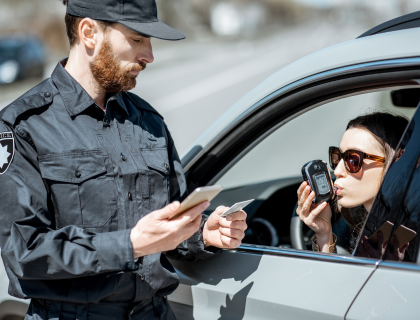 Victoria's drink-driving laws are some of the toughest in Australia. If you are caught drunk driving in another state with a licence from Victoria, you will face the same punishments as if the crime happened in Victoria. These offences come with heavy fines, time limits on your ability to drive, and, in the worst cases, jail time.
Victoria's drink-driving laws are some of the toughest in Australia. If you are caught drunk driving in another state with a licence from Victoria, you will face the same punishments as if the crime happened in Victoria. These offences come with heavy fines, time limits on your ability to drive, and, in the worst cases, jail time.
Everyone who has been caught drink driving must also go through the Drink Driver Behaviour Change Program, which is a six-hour course split into two classes. Several companies, approved by VicRoads, offer the course. Anyone found drink driving in Victoria will also have to use an alcohol interlock device before they can drive again. This device stops someone from starting their car if they have alcohol on their breath.
The person who broke the law must pay for both the initial cost and the ongoing costs of testing and maintaining the alcohol interlock device. The Road Safety Act 1986 sets the rules for driving while intoxicated in Victoria. Drink driving offences can be very serious, so don't hesitate to get more help from the skilled lawyers at Josh Smith Legal.
How Bad Is It To Drive While Drunk in Victoria?
First Offences
The penalties for people who drink and drive for the first time depend on the type of licence they have and their BAC level. The following penalties are in effect for offences committed after 30 October 2018. Please keep in mind that the penalties for offences committed before 30 October 2018 may be different.
- BAC less than 0.05: You will get a fine and must go through a Drink Driver Behaviour Change Program if you were caught with alcohol while you had a Learner's Permit, a P1 or P2 licence, or a full licence with a Z condition. You won't be able to drive for at least three months, and after that, you'll have to use an alcohol interlock for at least six months. It will be necessary for you to have no BAC for at least three years.
- BAC between 0.05 and 0.069: You will get a fine and must go through a Drink Driver Behaviour Change Program if you had a full licence and were 26 years old or older. People who got a Traffic Infringement Notice will not be able to drive for at least three months, and people who had to go to court will not be able to drive for at least six months. After that, you'll have to use an alcohol interlock for at least six months. It will be necessary for you to have no BAC for at least three years.
- BAC between 0.07 and 0.10: If you are found with a BAC between 0.07 and 0.10, you will be fined and have to go through a program to change how you drive. You won't be able to drive for at least six months after losing your licence or permit. After that, you will have to use an alcohol interlock for at least six months and have a BAC of zero for at least three years.
- BAC between 0.10 and 0.15: With a BAC of 0.10 to 0.15, you will get a fine and have to go through a Drink Driver Behaviour Change Program. In addition, you won't be able to drive for 10 to 14 months after losing your licence or permit. After that, you will have to use an alcohol interlock for at least six months and have a BAC of zero for at least three years.
- BAC above 0.15: People caught with a BAC above 0.15 will not be able to drive for 15 to 24 months. They will also have to go through the Drink Driver Behaviour Change Program, use an alcohol interlock device for six months, and have a BAC level of zero for at least three years.
For a Second or Later Offence
If the person has been caught drink driving before, they will be disqualified for longer for the above offences.
- BAC less than 0.15: People caught with a BAC of less than 0.15 will not be able to drive for 12 to 28 months and will have to use an alcohol interlock device for 12 months. For three years, they must always have no BAC.
- BAC 0.15 or higher: If someone is found with a BAC of 0.15 or higher, they will not be able to drive for 30 to 48 months and will have to use an alcohol interlock device for a time set by the court. During the time that the device is in place, they must have a BAC of zero.
Conclusion
Victoria's strict rules against driving while drunk show how much the state cares about road safety. Heavy fines, driving bans, behaviour change courses, and the installation of alcohol interlock devices are just some of the harsh penalties that offenders face. These rules apply not only in Victoria but also to Victorian drivers found drink driving in other states. These rules are based on the Road Safety Act 1986, which ensures that both first-time and repeat offenders receive appropriate penalties. Persons charged with drink driving in Victoria need to understand these rules and obtain an experienced lawyer.
Resources And Further Reading
- https://www.vicroads.vic.gov.au/licences/drink-driving-drug-driving-and-excessive-speed-offences/behaviour-change-programs
- https://www.vicroads.vic.gov.au/licences/drink-driving-drug-driving-and-excessive-speed-offences/drink-and-drug-driving-offences/drink-driving-offences#:~:text=If%20you%20are%20caught%20driving,most%20serious%20offenders%2C%20possible%20imprisonment.
- https://www.legislation.vic.gov.au/in-force/acts/road-safety-act-1986/201


